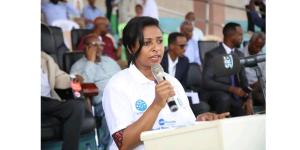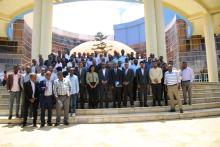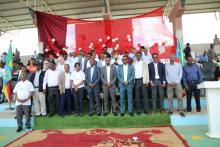Ethiopia Renews Fight Against Malaria on World Malaria Day
Jigjiga City, Ethiopia - Ethiopia's Ministry of Health (MOH) partnered with the World Health Organization (WHO) to observe World Malaria Day (WMD) in Jigjiga City. The theme for this year was "Accelerating the fight against Malaria for a more equitable world."
The event, held on May 11, 2024, aimed to raise awareness and advocate for intensified efforts against Malaria, a significant health threat in Ethiopia.
Jigjiga stadium hosted the main event, with high-level officials like Engineer Mohamed Shalle, Head of the Somali Region Prosperity Party, in attendance.
Engineer Mohamed emphasized the Ethiopian government's commitment to curb the adverse impacts of Malaria, highlighting nationwide reductions in its prevalence. He called for a comprehensive approach, including community engagement alongside healthcare efforts.
Dr. Hiwot Solomon, MOH's lead executive officer for Disease Prevention and Control, stressed the severe impacts of Malaria in sub-Saharan Africa, including Ethiopia.
She pointed out that 75% of Ethiopia's landmass is prone to Malaria, affecting 69% of the population in those areas.
She stressed that malaria cases have risen over the past three years, necessitating urgent action.
Dr. Mussie Ahmed, Head of the Somali Regional Health Bureau, echoed the need for collaboration between regional and federal health authorities as well as anti-malaria partners such as the World Health Organization. He acknowledged progress in the region but stressed the importance of sustained efforts to roll back Malaria.
The event included social mobilization activities and sports competitions to engage communities and emphasized shared responsibility in combating Malaria.
As Ethiopia reflects on World Malaria Day, the message is clear: unified, focused, and sustainable action is essential to curb the malaria burden, embark towards national elimination, and ensure health equity for all" Dr. Ayalneh Melesse, Malaria Specialist with WHO Ethiopia said on behalf of Dr. Owen Laws Kaluwa, WHO, Representative to Ethiopia.
WHO will further strengthen its strategic support for the malaria elimination and control efforts of the country, he added.
Quick Facts on Malaria:
Malaria is an acute febrile illness caused by a parasite known as Plasmodium. The disease is transmitted via the bites of infected mosquitoes. Of the four species that infect human beings, Plasmodium falciparum and Plasmodium vivax are the two most dominant malaria parasites in Ethiopia. They are prevalent in all malarious areas in the country (usually below 2000 meters above sea level) with P. Falciparum representing about 65-75% of the total reported malaria cases, relative frequency varying in time and space within a given geographical ranges.
Symptoms of Malaria include fever, headache, backache, joint pains, and vomiting, usually appearing between 10 and 15 days after the mosquito bite. If not treated, Malaria can quickly become life-threatening by disrupting the blood supply to vital organs.
Key interventions to control Malaria include: prompt diagnosis and effective treatment with appropriate antimalarial drugs, use of insecticidal bed nets; and indoor residual spraying of houses with insecticides to control the vector population.
About 75% of the land and 69% of the population is exposed to Malaria in Ethiopia. Ethiopia has diverse ecological characteristics in terms of malaria transmission, ranging from low to high. The health sector in Ethiopia is greatly affected by climate change, which has profound consequences on the transmission cycles of vector-borne infectious diseases like Malaria.
WHO has been actively supporting the Ministry of Health of Ethiopia (MoH) in the fight against Malaria. Among other contributions, WHO has been providing technical support in building the capacity of the health of workers, program monitoring, review and evidence generation, resource mobilization, supportive supervision at all levels, and supporting the revision and updating of strategic documents and guidelines.


